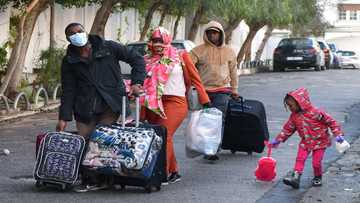Lassa Fever: Ghana Medical Association Urges General Public To Wear Nose Masks, Adhere To Safety Protocols
- The Ghana Medical Association (GMA) has admonished the general public to adhere to safety protocols
- This follows a surge in cases of Lassa Fever in the country, with one casualty so far
- GMA, in its statement, called on the public to wear nose masks to effectively curtail the spread of the fever
PAY ATTENTION: Enjoy reading our stories? Join YEN.com.gh's Telegram channel for more!
As Ghana’s cases of Lassa Fever continue to surge, several health experts are calling for the re-introduction of safety measures.
According to the Ghana Medical Association (GMA), the general public should strictly adhere to laid down guidelines on infection prevention and control protocols.

Source: Facebook
GMA advises public to strictly adhere to safety protocols
A statement issued and signed by the GMA on Wednesday, March 1, 2023, acknowledged the presence of the fever in Ghana and advised individuals to strictly adhere to the safety protocols.
PAY ATTENTION: Сheck out news that is picked exactly for YOU ➡️ click on “Recommended for you” and enjoy!
The statement said wearing nose masks proves crucial to curtailing the spread of Lassa Fever.
“This risk of spread among health professionals is high when infection prevention and control (IPC) protocols are not adhered to during the care of patients”.
The GMA says the consequences will be dire if people, including health workers, fail to adhere to the safety protocols.
Ghana records 13 cases of Lassa Fever, 1 death
Ghana currently has 13 active cases of Lassa fever with one death, with the Health Service beginning contact tracing 56 persons who came in contact with affected persons.
Humans can contract the virus by eating or touching household items that have been exposed to mouse urine or faeces.
Moreover, it can be contracted by coming into contact with an infected person's bodily fluids, such as their blood, urine, or faeces, or by touching their contaminated clothing or bedding.
Lassa fever symptoms are the same as those of other feverish illnesses, but they have serious consequences. These symptoms include sore throats, chest discomfort, muscle pain, nausea, vomiting, diarrhoea, coughing, and abdominal pain. Severe instances may also cause bleeding from the nose, mouth, or stomach.
Accra’s air quality above WHO recommended limit
Earlier, YEN.com.gh reported that Accra, Ghana’s capital city has seen its air quality soaring above the World Health Organisation’s (WHO’s) recommended level.
According to IQAir’s AirVisual, the air quality in Accra is 49.6 times higher than the WHO’s annual air quality guideline value.
New feature: Сheck out news that is picked for YOU ➡️ click on “Recommended for you” and enjoy!
Source: YEN.com.gh



